Make America Great Again Nostalgia 2008
Why Trump'due south 'Make America Great Again' nostalgia is a unsafe political tool
Every bit far back as you go, there's always someone longing for longer ago
By Emrys Westacott
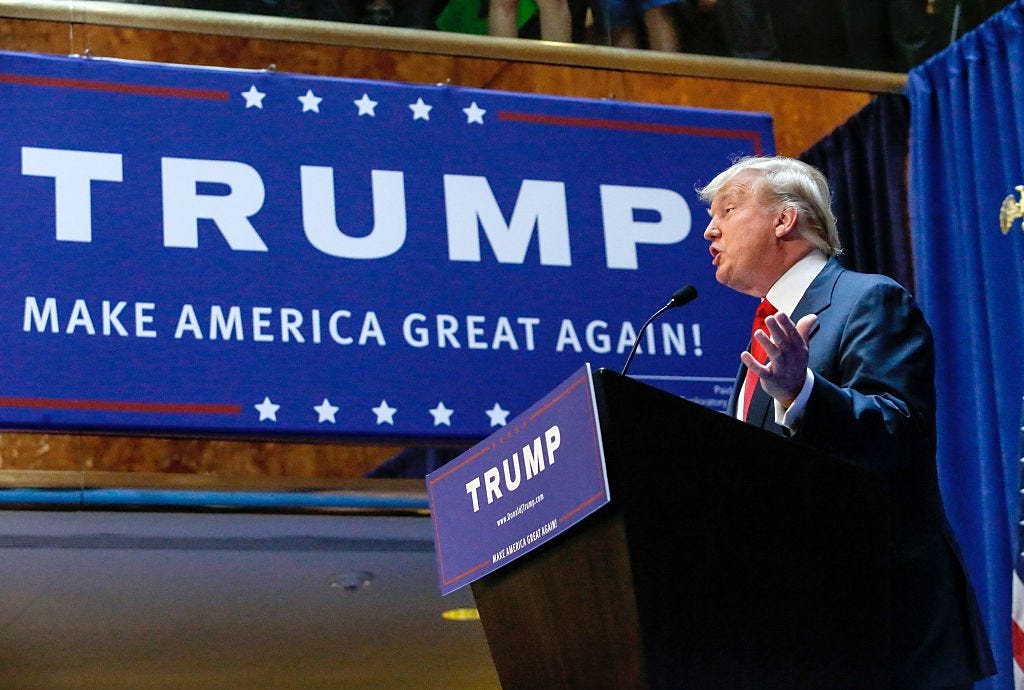
"Kake America great again!" … and once again, and again. Trump's campaign wants to rally supporters around that cry, motivating crowds with the idea of harking back to what America supposedly once was. In fact, "again" could be seen as the most important give-and-take in the phrase. That piddling adverb carries a lot of weight, implying that things are worse now than they one time were, and evoking a powerful political nostalgia for a past — whatever that past may be — that was allegedly ameliorate. Just no matter how far back you look, someone is e'er yearning to look back further, to an imagined better time.
The word "nostalgia" comes from the Greek nostos, which ways to return home, and algos, or hurting. Originally referring specifically to homesickness, nostalgia now signifies a much broader, bloodshot longing for familiar surroundings or the mode things used to be. Every bit a nation, this longing for a lost, ameliorate era is a political mainstay — one that appeals especially to the conservative-minded (who, by definition, tend to be somewhat astern-looking).
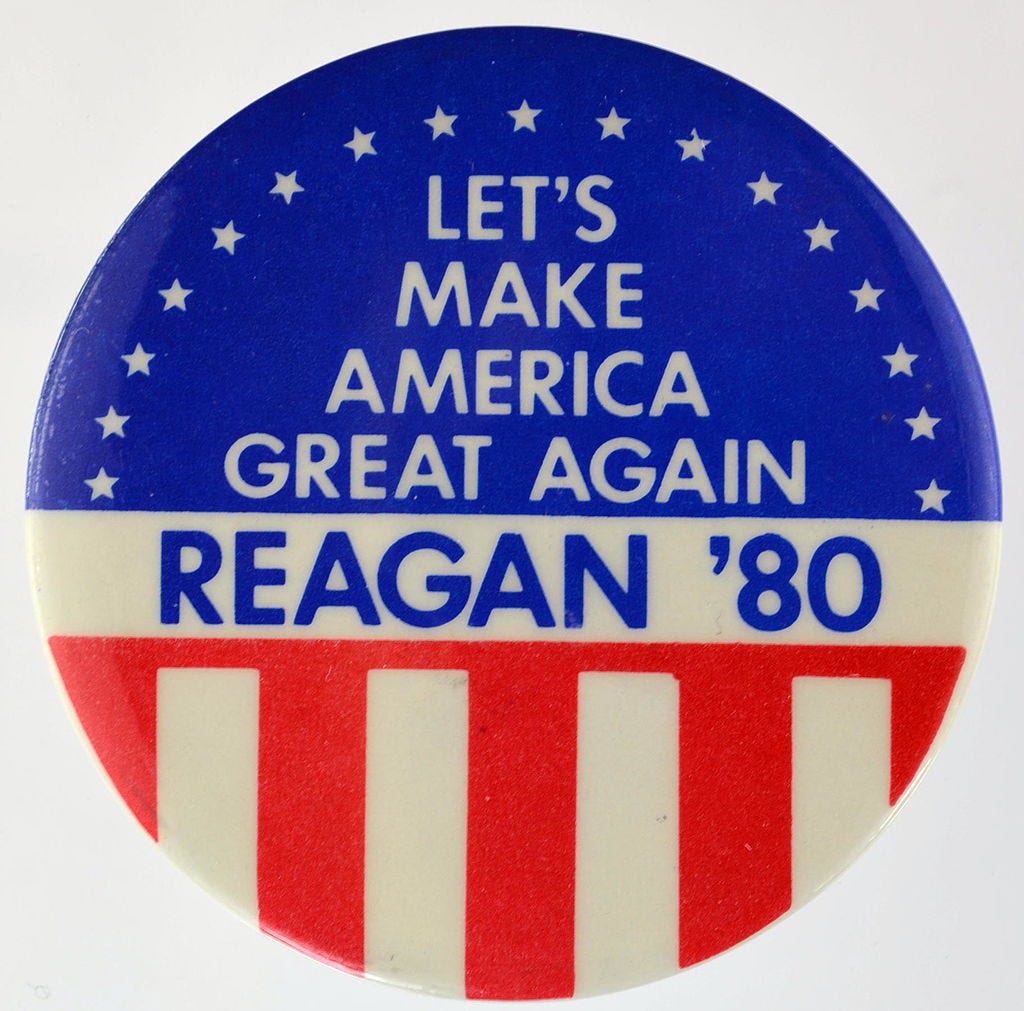
Interestingly, nostalgia is nigh often oriented away from complexity and toward simplicity. We wait back fondly to when things were supposedly simpler, more than clear, less confusing. We long for remnants big and small of an earlier historic period: TV remote controls with just a few basic buttons. Beingness able to board a plane without going through long, slow security procedures. Letting kids roam and play without fright of predators. Quiet family dinners without intrusive emails, texting, or Cyberspace browsing.
Many bourgeois policies and attitudes today are shot through with nostalgia of this sort. One example recently in the news is the legislation passed in North Carolina that discriminates confronting transgender people and others by insisting on traditional–and fixed–gender identities for bathroom use. A resistance to increasing ethnic multifariousness via immigration underlies the 2022 Republican platform, including a proposed wall forth the US-Mexico edge and the rescinding of amnesties granted to undocumented immigrants in 2012 and 2014. A leaning towards religious homogeneity is also evident in Republican support (also laid out in the 2022 platform) for "the public display of the Ten Commandments equally a reflection of our history and our Judeo-Christian heritage."

Underlying these political agendas is a real preference for a world in which everyone "knew their place" and behaved accordingly: when children obeyed their parents or felt the back of a hand; when men earned bread while women kept business firm; when white privilege and power went largely unchallenged. Even policy stances such as the telephone call for a return to the gold standard — which inappreciably any economists recollect is sensible or applied, merely which is supported by quite a few Republicans, including Donald Trump, Ted Cruz, and Ron Paul — smacks of this yearning for other, "simpler" eras. Like many political positions, the call for a return to the gold standard is largely symbolic. It signifies a desire for the simpler, easier to understand world in which a dollar bill equals a dollar'south worth of gold. Period.
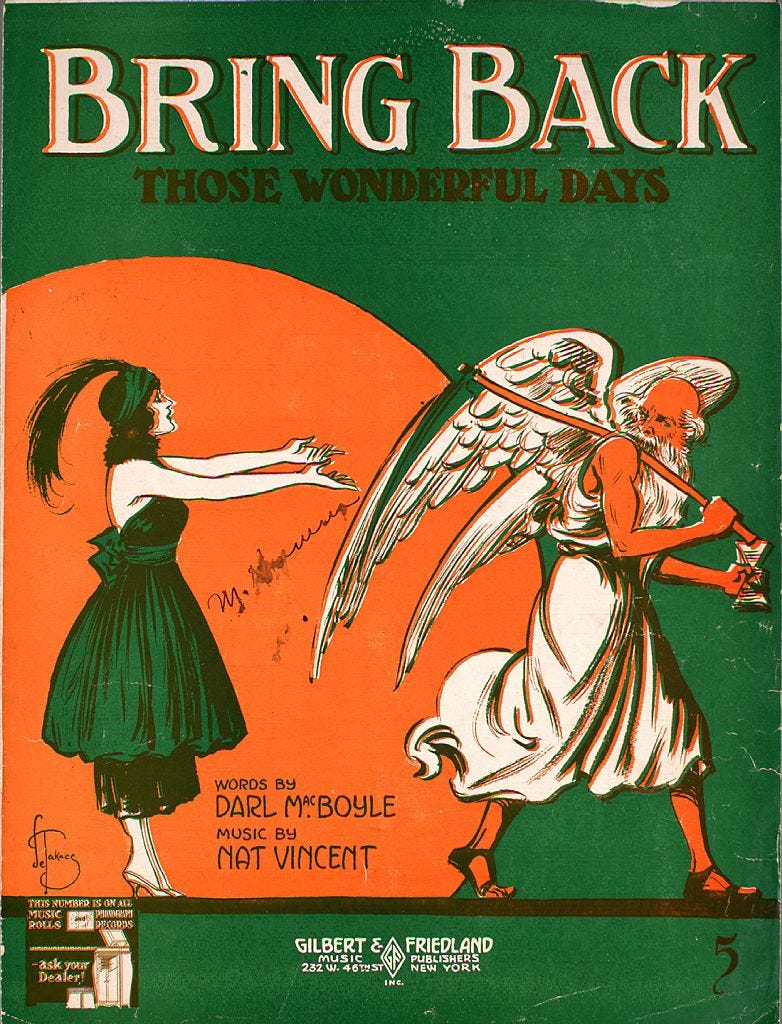
Nostalgia for simplicity is hardly a political symptom unique to our own age. This essential man tendency makes its appearance regularly in religion, philosophy, and literature through the ages. The biblical account of Adam and Eve in paradise is peradventure its quintessential expression: life in the Garden of Eden was so simple that you didn't need to work, didn't have to deal with kids, and didn't fifty-fifty need to wear wearing apparel!
Just there have been plenty of other versions. The Greek poet Hesiod (circa 700 BCE) compares the world he lives in unfavorably with a previous age when a "golden race of men" lived "gratuitous from toil and grief…..for the fruitful globe blank them fruit abundantly." The Roman poet Ovid (43 BCE — 17 CE) too recalls a Gold Historic period when the living was incomparably piece of cake since "of her own accord the earth produced a store of every fruit," and people were content to simply eat what nature provided without having to turn, harrow, sow, weed, or harvest. In The Consolation of Philosophy, Boethius (480–524 CE) sings a similar tune about a happy, long lost age when people lived just:
A grassy couch gave good for you sleep,
A gliding river healthy drink.
Similar many Trump supporters today, Boethius besides distrusted globalization, preferring a time when:
Men did not plunder all the world
And cut a path across the seas
With merchandise for foreign shores.
One of the most eloquent expressions of nostalgia for lost simplicity was penned by Jean Jacques Rousseau. Hither is how he conceives of man in the state of nature:
I see him satisfying his hunger under an oak, quenching his thirst at the starting time stream, finding his bed at the foot of the same tree that furnished his meal; and therewith his needs are satisfied.
Our happy ancestor, uncorrupted by civilization, had nothing to complain of or exist dissatisfied nearly — having so few needs or desires, for "the only goods he knows in the universe are nourishment, a female, and repose."
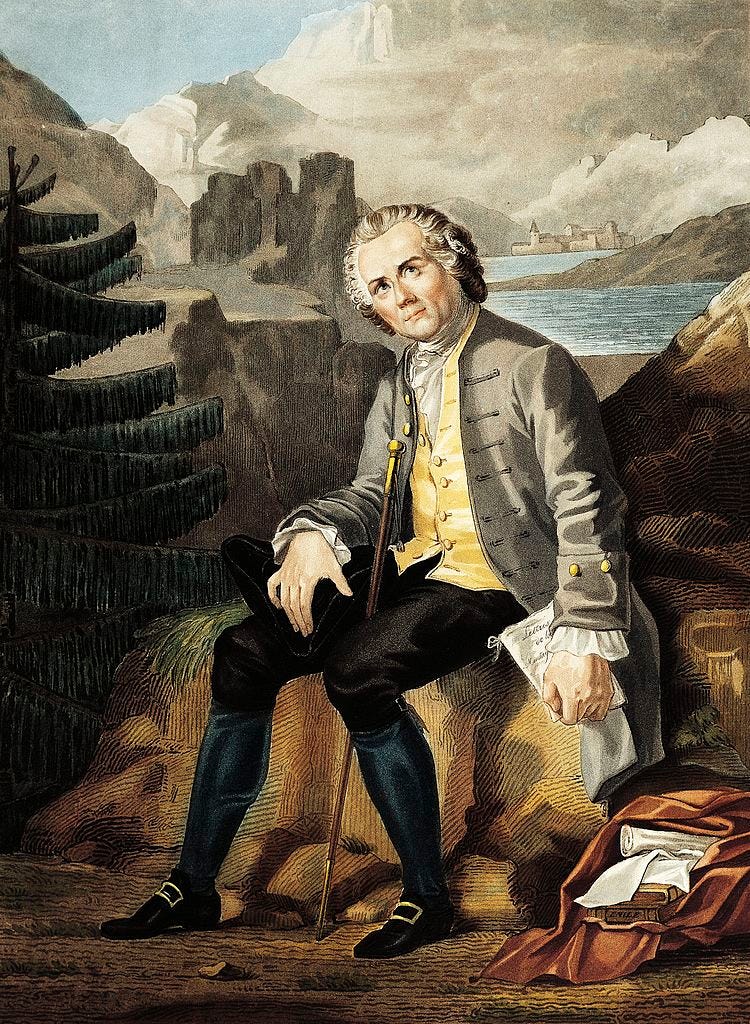
Like Boethius and Seneca before him, Rousseau links simplicity not merely to happiness but too to moral purity. And moral purity typically and significantly correlates with moral certainty. Take some other classic expression of nostalgia for a simpler world: the early Dylan song, "Bob Dylan's Dream." In this vocal (written at the ripe sometime age of 21!) the singer dreams of a fourth dimension now by when he and his friends found happiness in sitting around an old stove, laughing and singing through the night; a fourth dimension when telling wrong from correct was and then easy — every bit easy, he says, every bit telling black from white.
So Trump's message isn't just trite political propaganda. In fact, it belongs to a very erstwhile pattern of behavior in which people pine after and yearn for a lost simplicity — a pattern that is part of human nature itself. And if that longing has e'er been in that location, what in fact are we longing for? Viewing it in this context illuminates something very important: namely, that the lost, lamented and longed for by is mythical, not real. No matter when information technology happens, harking dorsum to an imaginary by is largely an empty practice which doesn't upshot in (or fifty-fifty refer to) a truthful reality.
A world in which almost nobody publicly comes out every bit gay, or advocates for gay rights, isn't really simpler than today's earth. In those times at that place was in fact more confusion, more misunderstanding, more feelings of guilt than there are at present that people have the knowledge, the vocabulary, and the license to talk openly about such matters. Nostalgia of this sort is really, at bottom, regret for lost privilege, what George Sanders in a contempo New Yorker article labels "usurpation anxiety." In other words, those yearning for a past are yearning for one in which things were better — for them.
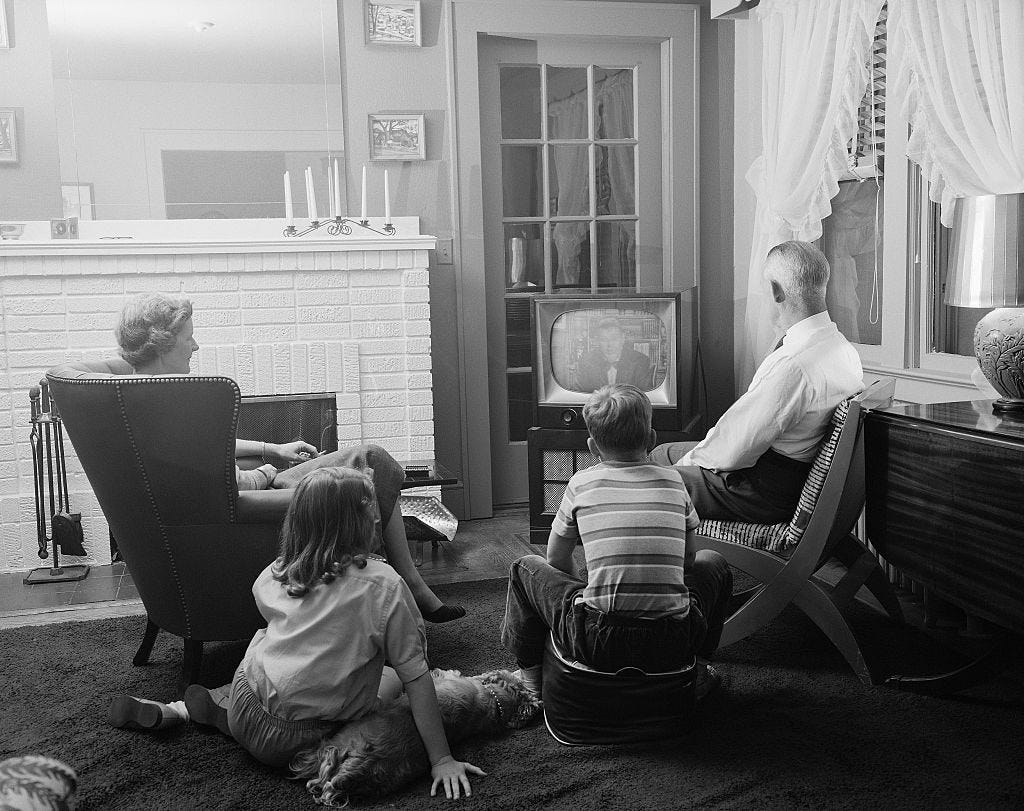
Giving into these longings for simpler, more clear cut times encourages the moral Manicheanism we used to run across in erstwhile fashioned Westerns or World War Ii movies. But the more we accept these kinds of black and white fallacies, the more prone nosotros are to accepting overly simplistic, reductive explanations of complex phenomena (similar the idea that immigrants are responsible for unemployment and wage stagnation) or overly simplistic, reductive solutions (like edifice a wall to go along immigrants out). One tin can even detect a yearning for simplicity in the "originalist" approach to the constitution favored by conservative justices similar Clarence Thomas.
Yes, commonage nostalgia tin sometimes be useful. It may assistance us recognize the value of something that we take lost or are in danger of losing: for instance, communities in which people felt more responsibility toward 1 another; ample free and unstructured play time for children; modes of living that put people in closer touch with nature. Simply this sort of remembering has to be combined with critical cocky-sensation.
Nostalgia is bloodshot — bitter because it concerns what we have lost; sweet because it concerns something we loved. It'due south one matter to be nostalgic for a lost summer crush from childhood; it's some other thing altogether to employ it to frame a national discourse. Constantly harking dorsum to an imaginary past turns u.s.a. away from the job before us as a society: non to chart a return to how things never were, but to build a futurity that accords with our xx-first century realities and ethics.
Emrys Westacott is Professor of Philosophy at Alfred University. He is the author of The Virtues of Our Vices and co-writer (with Chris Horner) of Thinking Through Philosophy. His articles and reviews have appeared in many publications, and he writes a regular monthly essay for the popular web log site 3QuarksDaily. His forthcoming book, The Wisdom of Frugality (Princeton Univ. Press) will be available in Fall 2016.
stricklandhourson.blogspot.com
Source: https://timeline.com/false-nostalgia-donald-trump-e935ef77018c
0 Response to "Make America Great Again Nostalgia 2008"
Post a Comment